ABU DHABI -- A Gallup analysis of more than 130 countries nearly a decade after the 9/11 terrorist attacks suggests that one's religious identity and level of devotion have little to do with one's views about attacking civilians. Almost all residents surveyed in the Middle East and North Africa (MENA), Asia, and sub-Saharan Africa who reject attacks on civilians say religion is an important part of their daily lives -- much like those who say attacks are sometimes justified.
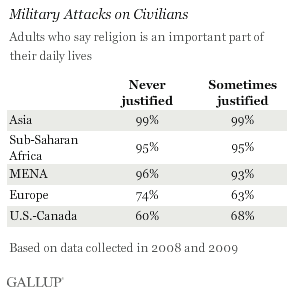
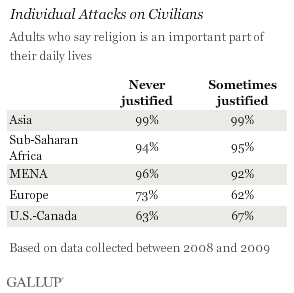
These key findings are among the many featured in a new brief released Friday by the Abu Dhabi Gallup Center, Views of Violence, based on Gallup surveys conducted between 2008 and 2010. Views of Violence examines public acceptance and rejection of attacks on civilians worldwide and what influences these attitudes.
Most Worldwide Agree Military Attacks Never Justified
Many of the world's residents agree that military attacks that target civilians are never justified, with a clear majority in Asia and the MENA region finding military attacks against civilians unacceptable. This is not surprising considering the acute conflicts raging in Afghanistan, Pakistan, Iraq, and other parts of the Middle East. Residents of the U.S. and Canada are the most likely population in the world to believe military attacks targeting civilians are sometimes justified, with nearly half (47%) sharing this sentiment.
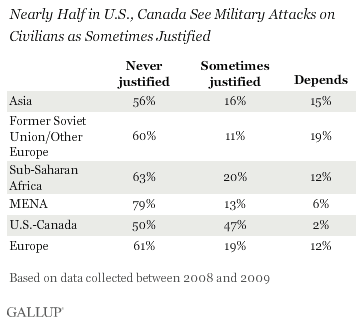
Europeans here break with their counterparts in the U.S. and Canada. The continent that fought two world wars and at one time used military conquest to colonize much of the Middle East, Africa, and Asia, now finds its residents more similarly minded with those in its former colonies than with its modern ally about whether military attacks on civilians are sometimes justified.
Individual Attacks on Civilians Unacceptable
The identity of the attacker makes a difference to some people when weighing the justification of targeting civilians. When attacks are committed by a military, Americans and Canadians find them more acceptable (47% sometimes justified) than when they are committed by an individual (21% sometimes justified). Europeans, too, make a distinction, and are more likely to reject individual attacks than military attacks by eight percentage points.
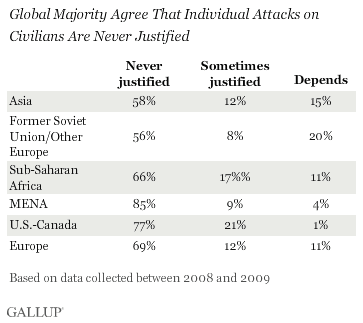
On the other hand, populations in Asia, sub-Saharan Africa, former Soviet countries, and MENA are more likely to view violence targeting civilians as uniformly unacceptable.
OIC Member States Less Likely to View Military Attacks as Sometimes Justified
Evidence refutes the argument that Islam encourages violence more than other religions. Residents of the Organisation of the Islamic Cooperation (OIC) member states are slightly less likely than residents of non-member states to view military attacks on civilians as sometimes justified, and about as likely as those of non-member states to say the same about individual attacks.
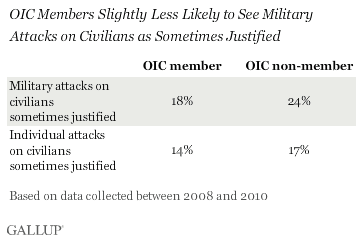
Public Support Does Not Predict Violence
It is important to note that public perceptions of civilian attacks do not necessarily predict violence against non-combatants, nor are terrorist activities or war crimes necessarily the result of public support. At the same time, higher levels of public rejection of targeting civilians do suggest a higher respect for the value of human life, a prized asset for any society to cultivate.
Rather than look to religion to explain public acceptance of violence, Gallup's analysis suggests that leaders should consider social and economic development and better governance. Gallup analysts tested correlations between the level at which populations say these attacks are "sometimes justified" and a number of independent indicators, and they found human development and societal stability measures are most strongly related. Find out more about relationships between these attitudes and a number of independent indicators in the full report.
Survey Methods
Results are based on face-to-face interviews with approximately 1,000 adults in each country, aged 15 and older, from 2008 through 2010. For results based on the total sample of adults, one can say with 95% confidence that the maximum margin of sampling error ranges from ±1.66 to ±5.8 percentage points. The margin of error reflects the influence of data weighting. In addition to sampling error, question wording and practical difficulties in conducting surveys can introduce error or bias into the findings of public opinion polls.
In this analysis, OIC member states included more than 40 predominantly Muslim countries worldwide. Non-OIC member states included more than 80 countries.
For complete methodology and specific survey dates, please review Gallup's Country Data Set details.
Learn more about how the Gallup World Poll works.
